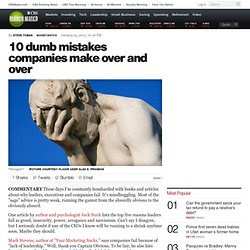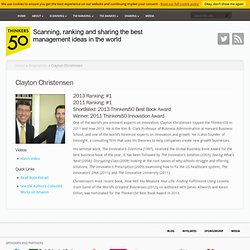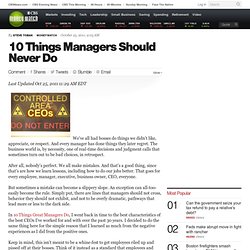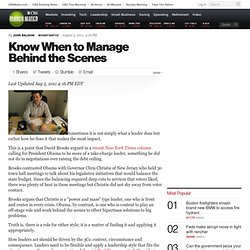

Succeeding as an organizational consultant. Why the Peter Principle Works. Last Updated Aug 15, 2011 2:40 PM EDT Everyone's heard of the Peter Principle - that employees tend to rise to their level of incompetence - a concept that walks that all-too-fine line between humor and reality. We've all seen it in action more times than we'd like. Ironically, some percentage of you will almost certainly be promoted to a position where you're no longer effective.
For some of you, that's already happened. Sobering thought. Well, here's the thing. Robert Browning once said, "A man's reach should exceed his grasp. " Now, most of us don't perpetually reach for the stars, but until there's clear evidence that we're not doing ourselves or anyone else any good, we're bound to keep right on reaching.
I mean, who turns down promotions? Wasn't America founded by people who wanted a better life for themselves and their children? Perhaps the most interesting embodiment of all this is the way people feel about CEOs. Well, not exactly.
Product Development. 10 dumb mistakes companies make over and over. "Not again!

" Picture courtesy Flickr user Alex E. Proimos COMMENTARY These days I'm constantly bombarded with books and articles about why leaders, executives and companies fail. It's mindboggling. Most of the "sage" advice is pretty weak, running the gamut from the absurdly obvious to the obviously absurd. One article by author and psychologist Jack Stark lists the top five reasons leaders fail as greed, insecurity, power, arrogance and narcissism. Mark Stevens, author of "Your Marketing Sucks," says companies fail because of "lack of leadership. " 10 reasons why smart people do dumb things And while leadership experts blog and tweet all sorts of generic, esoteric nonsense, executives and their companies keep making the same dumb mistakes they've always made, over and over again. Killing promising new businesses to maintain old ones. Lack of objectivity and perspective. Failure to articulate the company's strategy.
Chronically bleeding red ink. Not challenging the status quo. This One Leadership Quality Will Make or Break You. Thinkers50. 2013 Ranking: #1 2011 Ranking: #1 Shortlisted: 2013 Thinkers50 Best Book Award Winner: 2011 Thinkers50 Innovation Award One of the world’s pre-eminent experts on innovation, Clayton Christensen topped the Thinkers50 in 2011 and now 2013.

10 Things Managers Should Never Do. Last Updated Oct 25, 2011 11:29 AM EDT We've all had bosses do things we didn't like, appreciate, or respect.

And every manager has done things they later regret. The business world is, by necessity, one of real-time decisions and judgment calls that sometimes turn out to be bad choices, in retrospect. After all, nobody's perfect. We all make mistakes. But sometimes a mistake can become a slippery slope. In 10 Things Great Managers Do, I went back in time to the best characteristics of the best CEOs I've worked for and with over the past 30 years. Keep in mind, this isn't meant to be a whine-fest to get employees riled up and pissed off at their bosses. The Silent Language of Leaders. Know When to Manage Behind the Scenes. Last Updated Aug 5, 2011 4:16 PM EDT Sometimes it is not simply what a leader does but rather how he does it that makes the most impact.

This is a point that David Brooks argued in a recent New York Times column calling for President Obama to be more of a take-charge leader, something he did not do in negotiations over raising the debt ceiling. Brooks contrasted Obama with Governor Chris Christie of New Jersey who held 30 town hall meetings to talk about his legislative initiatives that would balance the state budget. Since the balancing required deep cuts to services that voters liked, there was plenty of heat in these meetings but Christie did not shy away from voter contact. Brooks argues that Christie is a "power and mass" type leader, one who is front and center in every crisis. Truth is, there is a role for either style; it is a matter of finding it and applying it appropriately. How leaders act should be driven by the 3Cs: context, circumstance and consequence. Some guidelines: 1.
5 Things Great Bosses Never Do.
Managing A Not-For-Profit Organization. Human Capital. Marketing. Organizational Strategy.